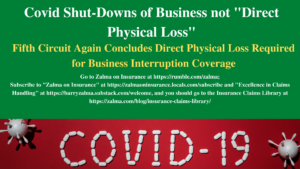They Keep Trying but: Covid Shut-Downs of Business not “Direct Physical Loss”


Aggie Investments, L.L.C. owns and operates a tea and spice gift shop in McKinney, Texas. Like many businesses, Aggie Investments suffered a loss in revenue during the COVID-19 pandemic when Texas civil authorities placed limitations on the operations of nonessential businesses. Aggie Investments then sought coverage from its commercial property insurance policy which covers losses “caused by direct physical loss of or damage to property at the described premises.”
In Aggie Investments, L.L.C. v. Continental Casualty Company, No. 21-40382, United States Court of Appeals, Fifth Circuit (January 26, 2022) the Fifth Circuit Court of Appeal joined with almost every court that has considered the issue and required proof of direct physical loss for coverage to apply.
FACTS
Faced with a claim for lost business as a result of a covid-19 shut-down order from the city, he insurer, Continental Casualty Co., denied the claim and in response, Aggie Investments sued. The district court dismissed Aggie Investments’ claim because Aggie Investments did not allege a direct physical loss of property – which the district court defined as a tangible alteration to property.
THE INSURANCE
Continental sold a commercial property insurance policy to Aggie Investments. The policy provides coverage for the loss of business income in the Business Income and Extra Expense (BI/EE) endorsement. That provision states:
We will pay for the actual loss of Business Income you sustain due to the necessary “suspension” of your “operations” during the “period of restoration.” The “suspension” must be caused by direct physical loss of or damage to property at the described premises. The loss or damage must be caused by or result from a Covered Cause of Loss.
THE CLAIMED LOSS
In March 2020, the COVID-19 pandemic caused authorities to issue orders to address the ongoing threat from the virus. The city of McKinney issued a shelter-in-place order. Aggie Investments complied with the orders, closed its shop, and suffered a reduction in sales and loss of business income.
Aggie Investments submitted a claim for coverage under the BI/EE provision.
DISCUSSION
In a case where the plaintiff seeks insurance coverage, if the insurance policy precludes recovery under its very terms, dismissal is proper.
In Terry Black’s Barbecue, L.L.C. v. State Automobile Mutual Insurance Co., the Fifth Circuit already held that, under Texas law, a “direct physical loss of property” in a similar commercial property policy means a tangible alteration or deprivation of property. Like in that case, Aggie Investments has not alleged a covered loss because it only complains of loss of revenue due to the closing of its shop. Throughout the pandemic, moreover, Aggie Investments had ownership of and access to its property even if it could not open its shop for normal business operations.
Because Aggie Investments was required to close its business entirely, it attempts to distinguish its case from Terry Black’s where the restaurants were only prevented from providing dine-in services. This distinction, however, makes no difference.
Whether a business is directed to cease one kind of service or all of its services, that order is not a tangible alteration or deprivation of property. Nothing tangible happened to Aggie Investments’ property.
Before adopting one interpretation of an insurance contract over another, the court must first determine there is more than one reasonable interpretation of the policy language, i.e., that it is ambiguous. [See RSUI Indemnity Co. v. The Lynd Co., 466 S.W.3d 113, 118 (Tex. 2015)] If both constructions present reasonable interpretations of the policy’s language, the court must conclude that the policy is ambiguous. The language is only ambiguous if, after applying the rules of construction, it remains subject to two or more reasonable interpretations.
Physical loss of property cannot reasonably be interpreted to mean loss of use for several reasons. Initially, that interpretation would render the adjective “physical” meaningless. A loss of use, as Aggie Investments states, would not necessarily be a physical (or tangible) loss. Because Aggie Investments’ interpretation would cover a loss that does not require rebuilding, repair, or replacement, its interpretation gives no meaning to the provision’s “period of restoration.” There being no ambiguity in the language of the policy, the Fifth Circuit concluded the BI/EE provision’s “direct physical loss of property” unambiguously requires a tangible alteration or deprivation of property.
A “direct physical loss of property” as stated in the BI/EE provision requires a tangible alteration or deprivation of property. Aggie Investments, having failed to allege such a loss, is thus not covered by the policy. Therefore, the Fifth Circuit concluded the district court properly granted Continental’s motion to dismiss.
Businesses continue to attempt to obtain coverage for business interruption as a result of the state or local government orders that required the shut-down of their businesses. The policies clearly, and unambiguously, required actual, direct, physical loss to the property causing the shut-down and loss of business. Without damage there is no coverage. The suits seem to be brought against the wrong entity – insurance doesn’t cover – but the order took “property” the business of the plaintiff who has a right to recover under the Fifth Amendment of the U.S. Constitution for a taking of the property. No one, to my knowledge, has tried to sue the city or state for such taking and continue to pursue insurers.

© 2022 – Barry Zalma
Barry Zalma, Esq., CFE, now limits his practice to service as an insurance consultant specializing in insurance coverage, insurance claims handling, insurance bad faith and insurance fraud almost equally for insurers and policyholders.
He practiced law in California for more than 44 years as an insurance coverage and claims handling lawyer and more than 54 years in the insurance business.
Subscribe to “Zalma on Insurance” at https://zalmaoninsurance.locals.com/subscribe and “Excellence in Claims Handling” at https://barryzalma.substack.com/welcome.
You can contact Mr. Zalma at https://www.zalma.com, https://www.claimschool.com, zalma@claimschool.com and zalma@zalma.com . Mr. Zalma is the first recipient of the first annual Claims Magazine/ACE Legend Award.
You may find interesting the podcast “Zalma On Insurance” at https://anchor.fm/barry-zalma; you can follow Mr. Zalma on Twitter at; you should see Barry Zalma’s videos on YouTube- https://www.youtube.com/channel/UCysiZklEtxZsSF9DfC0Expg; or videos on https://rumble.com/zalma. Go to the Insurance Claims Library – https://zalma.com/blog/insurance-claims–library/ The last two issues of ZIFL are available at https://zalma.com/zalmas-insurance-fraud-letter-2/
Like this:
Loading…







